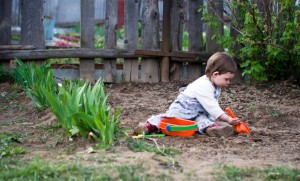READY TO GET STARTED?
REQUEST A FREE ESTIMATE
Fill out the form below or call (888) 466-7849 for a free, no-obligation estimate.
Glimpses of spring have filled the air here and there. Even though temperatures are unpredictable right now, it is the perfect time to plan for your garden. Ideal conditions, like temperatures and planting zones, vary depending on your location. The state of Georgia has 5 different plant hardiness zones or geographical areas in which specific plant life is capable of growing based on climate (source).
So what are some simple steps you can do right now to Plan for Your Garden?
Don’t have time for spring planning for your garden? Northwest Lawn Care offers FREE lawn care analysis, aeration and overseeding, and tree and shrub services. Save time and money and let the experts handle your lawn care year round!
 This past weekend I was outside working in the garden when I came across a few unwanted guests. There were a few spiders, a couple ground beetles, and a large amount of ants. The ants and beetles were present because my garden provides them with a large amount of food and water. The spiders were there because my garden provides them food (the other insects).
This past weekend I was outside working in the garden when I came across a few unwanted guests. There were a few spiders, a couple ground beetles, and a large amount of ants. The ants and beetles were present because my garden provides them with a large amount of food and water. The spiders were there because my garden provides them food (the other insects).
As most of you know the most common insecticides should not be used in gardens. Leaving the everyday gardener to reach out to “over the counter” products from their local nursery or hardware store to help rid them of pests. Although many of these products are effective for short periods of time, they require a minimum time lapse before you can harvest your yield. As many of you know, at Northwest Exterminating we care about protecting your family from pests in the most natural ways possible. And when it comes to the family garden our service technicians are trained to stop the pest before they enter the garden area. That being said, a lot of the garden insects start in the garden area and never leave it – making it hard to control them. So what can you do? Below I have listed some natural ways to help assist you in keeping the pest populations down in your family’s garden this growing season. Following these steps and methods will ensure a healthy garden with minimal pesticide use.
Environmental Tips:
Natural Plantings You Can Add To Help Keep The Pests Down:
We hope some of these tips help you keep your family garden healthier this season! For more information on Northwest’s Pest Control and Lawn Care Services visit us at callnorthwest.com
Adam Vannest
Director of Pest ServicesNorthwest Exterminating
[email protected]
 This past weekend I was outside working in the garden when I came across a few unwanted guests. There were a few spiders, a couple ground beetles, and a large amount of ants. The ants and beetles were present because my garden provides them with a large amount of food and water. The spiders were there because my garden provides them food (the other insects).
This past weekend I was outside working in the garden when I came across a few unwanted guests. There were a few spiders, a couple ground beetles, and a large amount of ants. The ants and beetles were present because my garden provides them with a large amount of food and water. The spiders were there because my garden provides them food (the other insects).
As most of you know the most common insecticides should not be used in gardens. Leaving the everyday gardener to reach out to “over the counter” products from their local nursery or hardware store to help rid them of pests. Although many of these products are effective for short periods of time, they require a minimum time lapse before you can harvest your yield. As many of you know, at Northwest Exterminating we care about protecting your family from pests in the most natural ways possible. And when it comes to the family garden our service technicians are trained to stop the pest before they enter the garden area. That being said, a lot of the garden insects start in the garden area and never leave it – making it hard to control them. So what can you do? Below I have listed some natural ways to help assist you in keeping the pest populations down in your family’s garden this growing season. Following these steps and methods will ensure a healthy garden with minimal pesticide use.
Environmental Tips:
Natural Plantings You Can Add To Help Keep The Pests Down:
We hope some of these tips help you keep your family garden healthier this season! For more information on Northwest’s Pest Control and Lawn Care Services visit us at callnorthwest.com
Adam Vannest
Director of Pest ServicesNorthwest Exterminating
[email protected]
You spend a lot of time on your lawn and plants in the warm months. You enjoy their beauty, their usefulness, and even their taste if you have vegetables in your garden. So you want to make sure that your plants stay healthy in the cold temperatures of winter. Rapidly changing temperatures, extreme temperatures, frost, and snow can damage your plants.
Here are some helpful tips to protect your plants from the cold:
For more information on lawn care, please visit our site at https://www.callnorthwest.com/lawn-care/